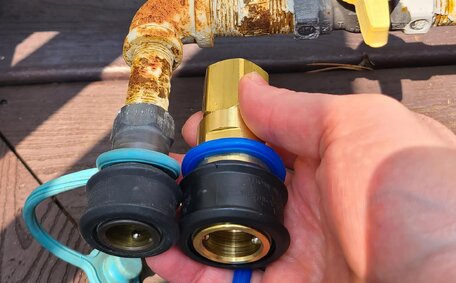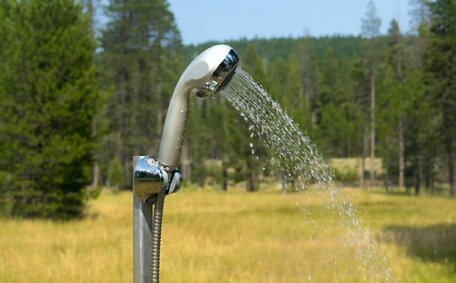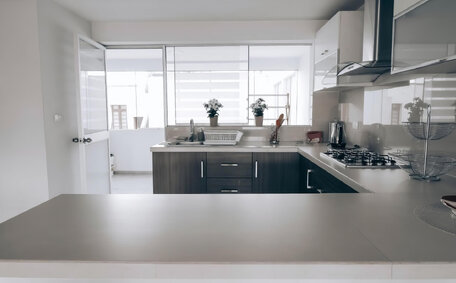Recognizing the Smell and Sounds of a Gas Leak
One of the most telltale signs to help you smell gas is the unmistakable odour of "rotten eggs" originating from gas lines or appliances. Other signs of a leak include hissing, whistling, or roaring sounds coming from appliances or pipes. Issues with gas may also be indicated by bubbling in standing water, blowing dust near gas lines, or dead vegetation around gas equipment. It’s imperative to heed these signals and vacate the premises if you suspect a gas leak. If possible, shut your gas valves to minimise exposure and understand how to detect leaks, as safety is paramount. In the event of a gas leak in your home, particularly in a commercial kitchen, act quickly by turning off the gas and phoning for professional aid. Contact your gas supplier immediately and open doors and windows to dispel hazardous gases.
If this odour is detected, promptly acknowledge the potential gas leak signs. Physical symptoms such as headaches, nausea, and dizziness may also indicate a gas leak.
Performing a Soapy Bubble Test to Detect Gas Leaks
While growing bubbles indicate a leak, a licensed gas fitter can conduct a comprehensive inspection.
This method requires spraying or brushing a soapy water solution along gas lines and connections, including those attached to your gas hot water systems, stoves, ovens, and meter.
To do this test:
- Combine a few tablespoons of liquid dish soap with water to make a solution that will reveal the gas flow through emerging bubbles. Shake well until sudsy.
- Ensure all gas appliances are switched off.
- Spray or brush the soapy solution liberally on seals, joints, valves and connections of gas equipment.
- Continuous bubbling indicates a leak, necessitating immediate actions like shutting off the gas for safety. If found, evacuate the property, avoid any flames or sparks, turn off the gas at the mains supply, open windows to ventilate and call Gladesville Plumbing right away.
Although the bubble test can reveal minor leaks, it’s not foolproof and additional indicators may be necessary for detecting leaks. Gas pressures and appliance venting can impact results. Periodic inspections by qualified Gladesville Plumbing technicians are critical, as they employ advanced leakage detection and diagnostic methods.
Using Gas Leak Detection Spray
Supplementing other techniques, a specialised gas leak detector spray is highly effective for precisely locating leaks. These specialised products contain agents that react instantly upon contact with escaping gas to identify leaks. This causes the spray to bubble up to precisely identify the origin of leaks.
When using detection spray:
- Purchase a reliable spray made specifically to locate gas leaks. General soap solutions may not react adequately.
- Follow all usage directions provided. Apply the spray externally along joints, seals, and connections on gas equipment.
- Observe closely where the spray bubbles up to identify leakage areas.
- Upon discovering a leak, immediately evacuate, ventilate the area, and call for professional help.
- While gas detection sprays can be handy for finding leaks, they should not be solely relied upon. Have any identified leaks further assessed and repaired by licenced Gladesville Plumbing gas technicians to be 100% safe.
With the proper detection spray and application method, small leaks in all open flued gas heaters can also be pinpointed. Always consult a skilled gas fitter for official leak checks and durable repairs.
Inspecting Gas Lines and Appliances for Leaks
Routine inspections and carbon monoxide testing are crucial to safety, ensuring your gas heaters and lines pose no risks. In both residential and commercial settings, you can prevent problems by staying alert for the distinctive smell of rotten eggs and scrutinising gas appliances for any odd indications. If a strong gas odour persists in your home, indicating a possible leak, leave comprehensive inspections to the professionals.
Read our comprehensive gas safety tips, which contain recommendations for regular inspections every 2 years to ensure maximum protection:
- Take time to visually inspect your gas line and fixtures for any sign of corrosion or damage. Signs include rust, dents, or loose connections.
- Clean dust or debris off appliances and never use anything that may conceal a potential gas leak.
- Check burner flames are blue and steady, not fluttering orange, to alleviate risks of carbon monoxide poisoning from harmful combustion byproducts.
- Listen and smell for any indication of leaks around all gas equipment.
- Organise carbon monoxide testing with a licensed gasfitter every two years to assess gas pressures, pipe integrity, and proper appliance functioning.
- Think about placing a CO alarm in your home for additional safety measures.
- Insist on comprehensive safety checks during annual inspections by licenced Gladesville Plumbing gas technicians to catch any leaks or faults.
Act proactively with maintenance to prevent gas leaks and avert potential disasters.
Gladesville Plumbing has the tools and know-how to thoroughly inspect every inch of piping, plus diagnostically test appliances for safety.
Monitoring Gas Meters for Unusual Usage
You should call your gas provider if unusually high consumption measured in your gas bills is also evident, potentially indicating issues with your gas lines. With Gladesville Plumbing’s prompt, professional assistance, potential disasters can be averted.
Be sure to record your gas meter readings consistently at the same time each day or week and monitor for unusual spikes in usage. If your metre or bills show a significant, unexplained rise in gas usage, arrange for Gladesville Plumbing to urgently detect gas leak in your network. Our technicians have the proper electronic gas leak detectors, diagnostics tools, and knowledge to detect gas leak your system might have. They can survey every connection and fitting as well as pressure test your systems to identify problems before they become hazardous. Be sure to record your gas meter readings consistently at the same time each day or week and monitor for unusual spikes in usage. They can survey every connection and fitting as well as pressure test your systems to identify problems before they become hazardous.
Installing Gas Detectors and CO Alarms
Installing both indoor gas detectors and carbon monoxide (CO) alarms in your home is an essential safety precaution. Gas detectors can alert you with loud alarms to any gas concentration issues, declaring where natural gas can be leaking, as part of essential natural gas safety measures. To secure the safety around your home, install detectors in locations prone to gas accumulation, including near appliances, metres, gas cylinders, and pipes, following the guidance by Energy Safe Victoria.
Opt for alarms endorsed by experts, and don’t hesitate to contact your gas supplier for conforming options with the AS/NZS 4641 standard. Follow the manufacturer’s instructions carefully regarding detector placement.
CO alarms are equally critical.
Carbon monoxide is an odourless, invisible gas produced when fuels burn incompletely. Position CO alarms near all sleeping areas and on every level of the home, considering that carbon monoxide is denser than air, in accordance with AS/NZS 5033. Test both gas and CO detectors monthly and replace as per the manufacturer’s guidelines. Carbon monoxide is an odourless, invisible gas produced when fuels burn incompletely. Consulting qualified Gladesville Plumbing technicians ensures proper protection for your home gas system, tailored to your home’s layout for maximum security and peace of mind.
Looking for Signs of Exposure Like Headaches or Nausea
Being attentive to gas odours and sounds for leaks, remain vigilant to physical symptoms that could be telltale issues with gas exposure.
Other health effects like chest pain, breathing difficulties, irritated eyes, and disorientation can also manifest. Never ignore what your body is telling you, asking yourself what do gas leak symptoms feel like if you suspect them. Evacuate the area immediately and turn off gas if you can safely do so if any concerning symptoms arise.
Avoid sources of ignition, turn off appliances involved, open windows to ventilate, and call emergency services if your safety is threatened.
Technicians can determine if you suspect a gas leak or appliance issues are allowing hazardous gases like carbon monoxide to accumulate. Pay attention to physical symptoms in the presence of gas appliances and consult experts if you suspect a leak.
Prioritise the health and safety of your gas appliance environment above all else.
Regular Maintenance and Servicing by Professionals
Professional servicing of your gas appliances and systems by qualified technicians is essential for maintaining safety and preventing leaks. Our licenced gas fitters have the expertise to thoroughly test for leaks, assess combustion performance, check for monoxide poisoning risks, and confirm proper function.
Gladesville Plumbing recommends organising annual maintenance checks for all piping, fittings, heaters, and ventilation systems.
During routine Gladesville Plumbing servicing, make sure they employ meticulous scrutiny on your gas system, including verification for any combustion issue or leakage using advanced electronic detectors.
Any issues with your gas appliance get repaired immediately before they escalate. Don’t wait until there are scary signs of escaping gas.
Proper Ventilation and Use of Gas Appliances
It’s essential to open all doors and windows to avoid negative pressure which can deplete oxygen levels, allowing incomplete combustion to occur in enclosed spaces.
Gas space heater appliances consume oxygen during use. Confirm unobstructed ventilation when using gas cooking systems or appliances.
We also verify proper clearances from the heat exchanger and ventilation terminals on exterior walls. Don’t let ventilation issues go unaddressed.
Yearly maintenance on gas heater appliances, including open flued types, helps keep your units, exhaust fans, vents, and combustion air openings clear and functioning correctly. Avoid misfortune with proactive checks from professionals ensuring the safe use and operation of your gas systems.
What to Do in Case of a Suspected Gas Leak
If a gas leak is detected at your home or business, immediate action is critical for safety. Evacuate everyone from the area and assemble outdoors in a safe, open area upwind of your gas appliances.
Call 000 to request emergency services, and view our immediate steps from Gladesville Plumbing straight away. Provide the exact location and hazards involved so responders are well informed.
As you exit, shut off the main gas supply valve if it is easily accessible to ensure the area is gas safe. On your way out, open exterior doors and windows to ventilate the property on the way out. However, don’t embark on prolonged searches for valves if it’s tough to access them in your home, which can raise risks. Avoid using electric switches or lighting flames that could ignite accumulated gas in your property.
Do take gas leak precautions, especially near gas utility points such as the gas metre or LP gas cylinder. Evacuation is the priority.
Ensure responders check every appliance, line and fitting for leaks using approved methods.






